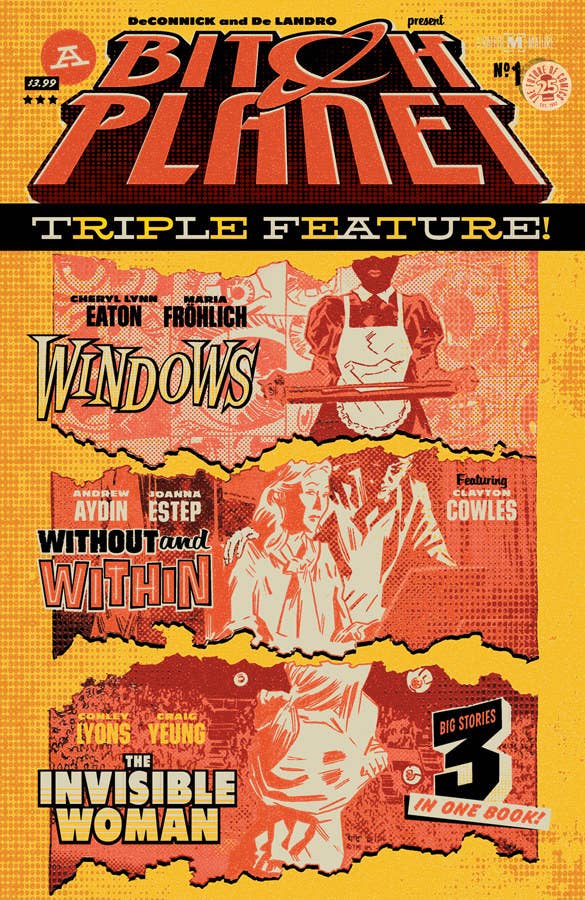
No one can decide what a superhero in 2017 should look like. Over the last few years, a series of missteps have contributed to a widening gulf between an increasingly diverse comics readership and the industry behind their favorite titles.
At the end of last year, DC Comics faced criticism after canceling a Wonder Woman series led by a husband-wife creative team and rebooting the character without women creators involved. Then in March this year, an executive at Marvel blamed new, diverse characters for the company's slowing sales. And at the same time, one of Marvel's current best-selling series has rewritten Captain America's origin story to reveal he's actually been a Nazi all along.
This month, Image Comics is releasing Bitch Planet Triple Feature, the third installment of a collection of stories written within the Bitch Planet universe. The series has been praised for its portrayal of "noncompliant" characters and refreshing storylines. It's all set in an environment best described as Orange Is the New Black in space.
BuzzFeed News asked five writers and artists responsible for creating the new Bitch Planet stories about how — and whether it is even possible — to create new comic book heroes in 2017, and what these characters should look like. Their answers have been edited for length.
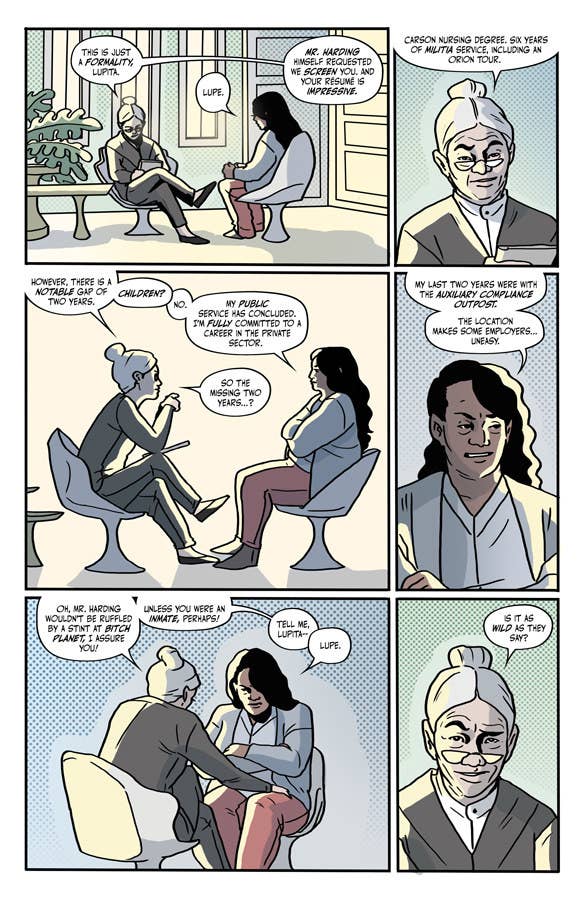
Maria Fröhlich
Fröhlich is a comic book artist based in Sweden. She has worked on a number of Swedish-language titles and English comics such as Shadow Show.
"I believe that when we as readers feel disconnected from characters, it’s because they’re not written as vulnerable and multidimensional human beings. Stereotypes and gender-normative writing can have this effect, because it easily strips the characters of human complexity. American comics have for a long time been dominated by white male narratives, and women, especially women of color, have been greatly underrepresented.
"I’m glad to see that this is beginning to change. I’ve worked mostly in Sweden for the last 10 years and in Sweden this has already happened, but it's still around 50/50 white men and women. The problem here has more been the lack of representation of people of color.
"I’ve always loved comics that dealt with the hard questions of the real world, at the same time as being extraordinary adventure stories. And I think we need new heroes to meet this new, sometimes dystopian world and its mind-boggling complexity. I think I can only try to tell stories as authentically as possible; the road to thriving and achieving is riddled with smashing glass ceilings, kicking down doors, and just refusing to give up."
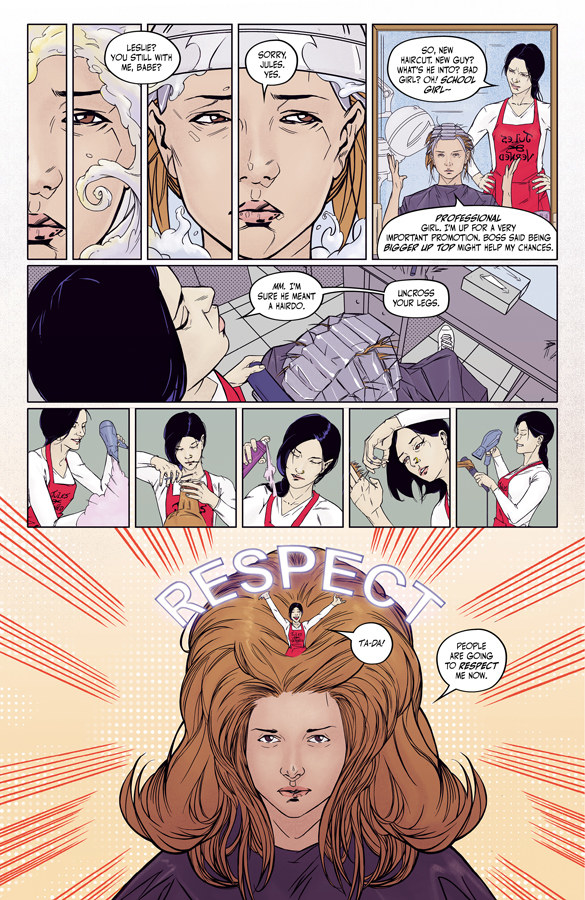
Conley Lyons
Lyons is a writer based in North Carolina. She has previously contributed to the anthology Athena’s Daughters.
"From a larger perspective, I think the question for me is not necessarily 'How do you write a hero in 2017?' but 'How do you write in 2017, period?' As we've seen worldwide over the past few months, writing is still a very subversive act.
"[Bitch Planet creator] Kelly Sue DeConnick’s usual quip is 'make women people,' which I’ll steal for the moment, because that’s the shortest explanation. I want each of my heroes to have positive and negative traits, genuine — not cutesy — flaws, and multiple conflicting beliefs and/or goals. If you're constructing a story, the starting point is to figure out precisely who that hero is, and not just what she does.
"When I think about current comics I’m reading right now, or creators who constantly make me sit up and take notice, those books are typically from people who are making classic story arcs for folks who didn't have heroic representation as kids.
"For example, there's an Indigenous Comic Con now. Moonshot, an anthology from Alternate History Comics, won Best Book of 2015 from the School Library Journal, and had a Kickstarter for volume 2 last year. Arigon Starr's got a great series called Super Indian. As a Native kid growing up in rural North Carolina, who didn't know any other Indians except my relatives, I never dreamed I would get to read so many comics by indigenous creators, let alone that we could just pop open a new tab and order them in minutes. It's incredible. It makes me so happy."
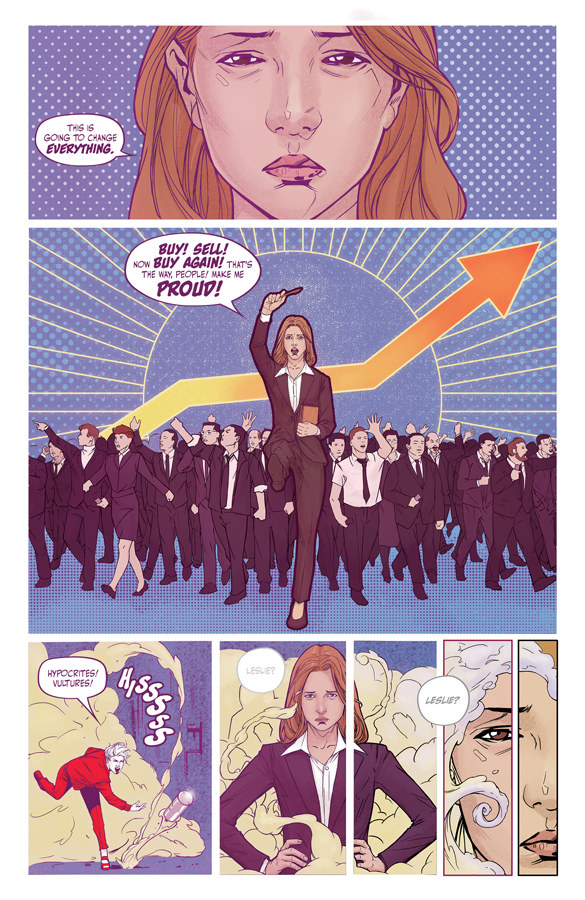
Craig Yeung
Yeung is a freelance artist who has worked on titles such as X-Men: Legacy and Wolverine Max.
"Many people turn to comics and other entertainment media as a way to escape, but at the same time we are always looking for ways we fit into this crazy world. What better way than from characters that look and act like you?
"Traditionally the comics industry has directed their comics to a cis white male audience so it's natural that all their stories revolved around that. Nowadays, comics have become more and more inclusive as we realize that the world isn't just made of this one demographic and comics can be a powerful medium for inspiration, empowerment, and conversation. We see more people of various gender identification as well as people of color raise up their voices and tell their own unique stories.
"I think it's vitally important for more women to raise up their voices at this time. Women make up half the world, so they have a powerful voice. Whether it be through satire or more realistic stories, their views must be told. I think it's true for minorities as well, in any category, to speak up during this time, to tell truthful and heartfelt stories that spark conversation and hopefully change."
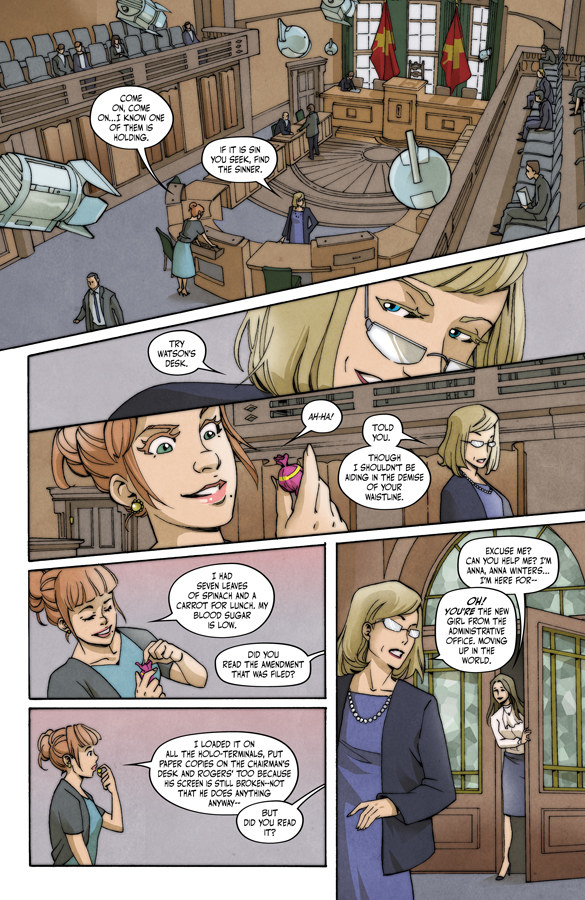
Joanna Estep
Estep is an illustrator. She's worked on the Fantastic Four 100th Anniversary Special, Death Head, and Fraggle Rock.
"This is another hard question for me, because I dislike typical hero- and role-model-type characters, and I especially hate any kind of pressure to make female or nonbinary characters into role models. Some of the most interesting characters to me are the imperfect ones. The ones who are ugly, and scary, and unapproachable. I need women characters to be people, and not just role models. When I’m writing/drawing women as people, that’s when I feel like I’m achieving something.
"I think people are tired of seeing straight, white cis men all the time, but I don’t think gender has much to do with whether a character is interesting or unappealing.
"I do think that female writers and artists need to play a bigger role in the comics industry, because I think that the female fanbase deserves to be acknowledged more than they typically are. I’m not talking about making a hundred more rose-colored rom-coms, but just… a general vibe that someone is taking me and my preferences into consideration when creating characters and stories."
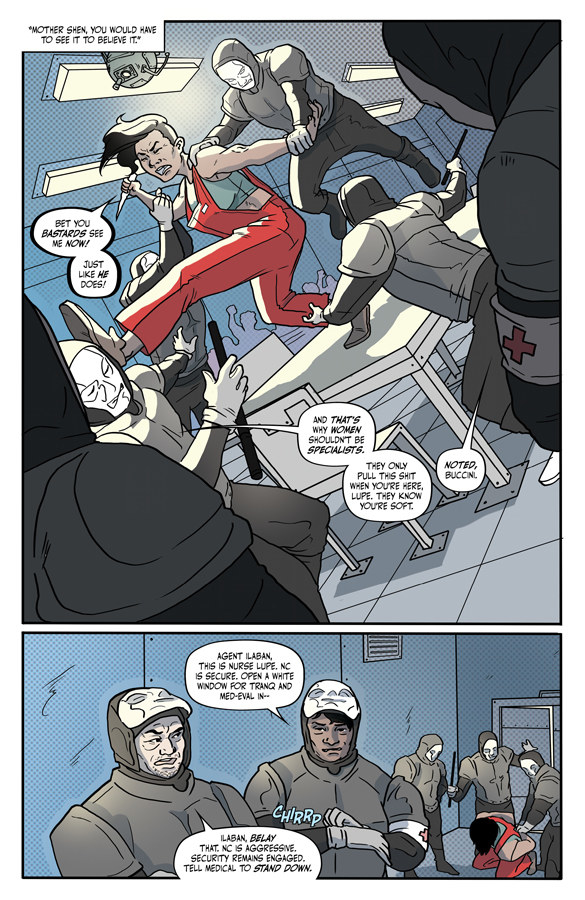
Cheryl Lynn Eaton
Eaton is a writer and head of the Ormes Society, a group that promotes the inclusion of black women in the comics industry.
"I’m certainly not going to lie and say it’s not difficult — because it is difficult. Because as much as you want to be inspiring and delve deep into those power fantasies, the reality of discrimination is there tugging away at that thread to unravel any tapestry you weave. What does discrimination do? It curtails your actions. It robs you of your agency. It makes you second-guess your ability. The glass ceiling in comics is very real and very thick and its existence makes it hard to get into a space to write women who can do anything when you know that women who look like you aren't considered worthy of a seat at the table at a majority of the companies in your industry.
"I truly believe there is no such thing as a boring character — because there are no boring people. Every one of us has something about us that is quirky and fascinating — even if we don’t realize it. And I think part of that necessity is being able to explore the parts of masculinity, of being a father, of being a man that are often overlooked. What we need is not a rejection of male characters, but a broadening of who gets to create and examine them. I think diversity has become a buzzword of sorts indicating female characters and characters of color without people realizing that it simply means variety — a wide array of characters and creators. Not a wide array of straight white guys pushing female characters of color to the masses. I’m a fan of 'cross-pollination.' Let everyone get a crack at everything.
"When I say that women are the future, I mean that equality is the future and our society is going to freak out about it and argue that women are taking control. And if the complaints are going to roll in anyway, we might as well have some fun with it."
Bitch Planet: Triple Feature is out 14 June.
